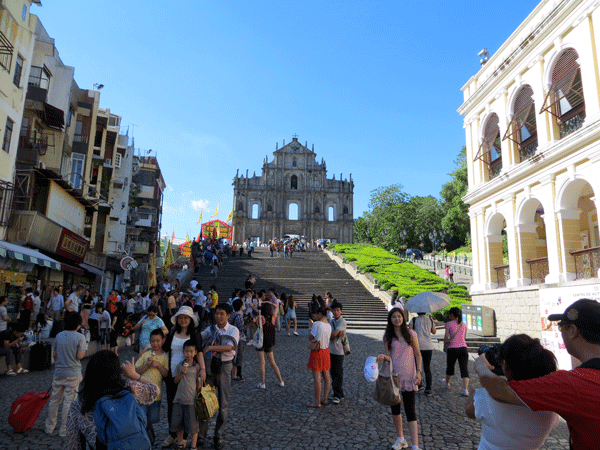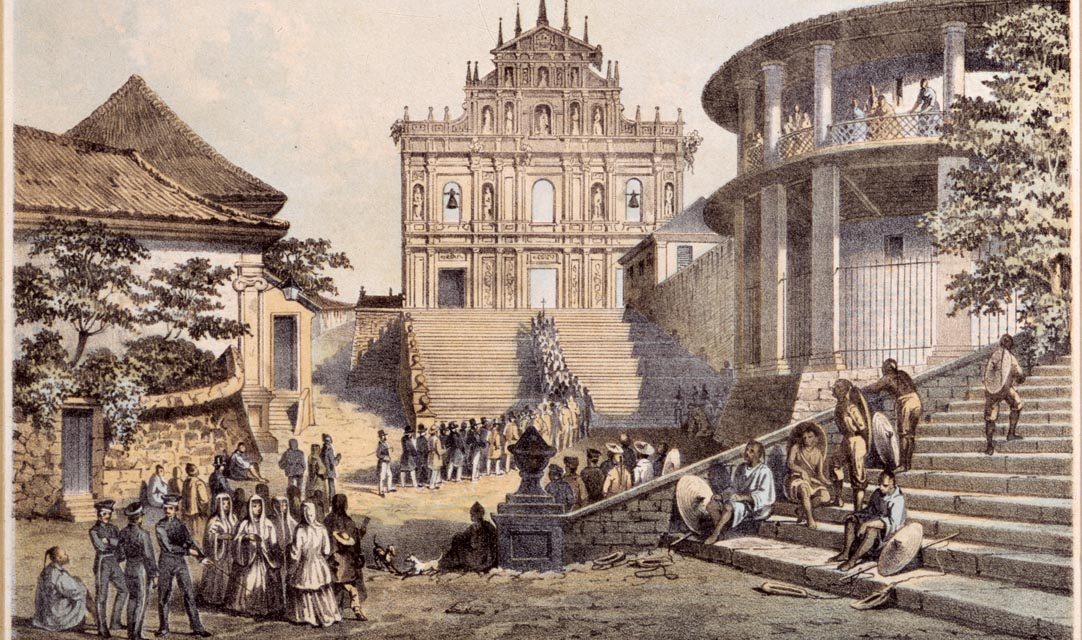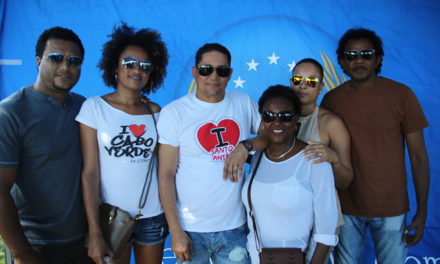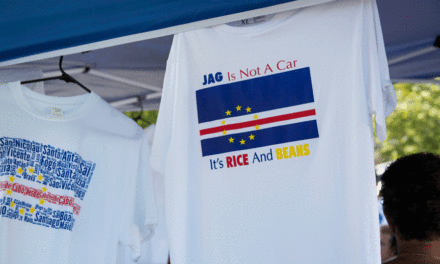It is an interesting coincidence that here at Cabo Verde Network, you would find someone of partial Chinese descent commenting on things that are singularly Cape Verdean. As Adam Cheung did with his article on Cachupa. As well as someone of Cape Verdean descent (me) doing the same about a Chinese favorite, Egg Tarts from Macau. Adam went to high school around Cape Verdeans and I did the same around Chinese people in Hong Kong. The clichés goes that the world is a small place but it turns out it also has a sense of humor.
I spent my formative years in Hong Kong, a former British colony. Before then I had lived in Washington DC. One of the hardest parts of transitioning between cultures at the time was being told by my new teachers that I was spelling words wrong. Hong Kong follows the British spelling for words like; ‘humour’ and ‘favourite’ and in America these words do not have a ‘u’ in them. Many things also came as culture shock but I soon learned that when you open your mind, you often gain perspective. One of things that opened my mind at the time were Chinese Egg Tarts from Macau. Also the fact that there was a Macau, a Portuguese colony at the time, on the southern tip of China, a ferry ride away from Hong Kong.

St. Paul – Macau, China
If you spend any time exploring any of the former Portuguese colonies, one thing becomes clear. The Portuguese have a fondness for pattered cobblestone streets. Whether on the Praça de Camões in Lisbon or the Plato district of Praia in Cabo Verde, you will eventually come across this enduring memory of Portuguese colonization and Macau is no different.
Portuguese pavement or calçada Portuguesa, consists of small flat pieces of various stones arranged to form a pattern or picture. It is a signature of Portuguese colonization and the effect to a history junkie like me is like that of walking through history.
During the age of discovery Portuguese sailors explored the coasts of Africa and Asia. Portugal’s King Manuel I in 1517 commissioned a diplomatic and trade mission to Guangzhou, China headed by Tomé Pires and Fernão Pires de Andrade. The mission was rejected by the Chinese Ming court, which had become less interested in foreign contacts after reports of misbehavior by Portuguese elsewhere in China and Goa, India. In 1522 more Portuguese ships reached the area but were also repelled by the Ming authorities. Pires was eventually imprisoned and died in Canton, present day Guanzhou.
Following a ship wreck in 1535, Portuguese traders were allowed to anchor ships in Macau’s harbors and granted the right to carry out trading activities, though not the right to stay onshore. Good relations between the Portuguese and Chinese Ming dynasty did take hold in the 1540s, when Portuguese aided China in eliminating coastal pirates.
In 1557, the Ming court finally gave consent for a permanent and official Portuguese trading base at Macau. In 1558, Leonel de Sousa became the second Portuguese Governor of Macau. China retained sovereignty and Chinese residents were subject to Chinese law, but the territory remained under Portuguese administration.
Many have called this Macau’s golden age when the Portuguese, Macanese, Tanka and Chinese peoples lived in harmony and the volume of trade would see many grow rich. It also coincided with the unification of the Spanish and Portuguese crowns, between 1580 and 1640. The alliance of Portugal with Spain would also have a negative effect in that, it meant the Portuguese colonies became targets for the Netherlands which had been in a struggle for independence from Spain at the time.
In 1602, the Dutch attacked Macau several times. A full-scale invasion attempt took place in 1622. 800 attackers were successfully repelled by 150 Macanese and Portuguese defenders and a large number of African slaves. This is the earliest account I have come across of Africans being in Asia.
Macau had became the major European settlement in China but that would change in 1844 with the establishment of the British colony of Hong Kong a very short boat ride away. Macau’s position as a major regional trading center sharply declined due to larger ships being drawn to the deeper water port of Victoria Harbour in Hong Kong.
This started a period of violence in Macau that in later years would manifest again at times of social change. Portugal expelled Chinese officials and started taxing Chinese residents. In 1848 a revolt by Tanka boatman was also put down. The Portuguese abolished the Chinese customs and declared Macau a free port. In response, local Chinese elements assassinated Governor Ferreira do Amaral.
When the communists came to power in China in 1949, nationalist movements started all over China and the seeds to Macau’s eventual return to China would be planted. In 1974, following an anti-colonialist revolt, Portugal relinquished all claims over Macau and proposed to return Macau back to Chinese sovereignty.
Aside from the political shifts, during this period Macau also increased its profile on the world stage. In 1954, the Macau Grand Prix was established, first as a treasure hunt throughout the enclave and in later years as formal car racing event. In 1962, the gambling industry of Macau saw a major breakthrough when the government granted the Sociedade de Turismo e Diversões de Macau (STDM), a syndicate jointly formed by Hong Kong and Macau businessmen, the monopoly rights to all forms of gambling. The Macanese economy today is dominated by gaming.
The Joint Declaration of the Government of the People’s Republic of China and the Government of the Republic of Portugal on the Question of Macau (Wow! Mouthful!) was officially signed in April 1987 and ratified on 15th January. The declaration stated that the Portuguese government would be responsible for the administration of Macau until 19th December 1999. The historic handover of Macau sovereignty back to China would take place on that day.
Spend any extended time in China and these mouthfuls become easier to handle but, The Basic Law of the Macau Special Administrative Region of the People’s Republic of China, was adopted by the National People’s Congress (NPC) on 31st March 1993 as the constitutional law for Macau, taking effect on 20th December 1999.
The PRC promised that, under its “one country two systems,” policy, China’s socialist economic system would not be practiced in Macau and that Macau would enjoy a high degree of autonomy in all matters except those of foreign affairs and defense until 2049 – fifty years after the handover. Hong Kong would also be returned to China under a similar policy two years earlier.
In Macau today the remnants of this colonial past is visible where ever you go. Highly notable in the people who share Portuguese and Chinese ancestry, these are referred to as the Macanese. In Hong Kong, holders of the genetic dichotomy are called Eurasians and a frame of reference for their appearance would be Cabo Verde Network’s own Adam Cheung.
Since the handover, Macau’s population demographic has seen an influx of mainland Chinese, whom the traditional Macanese/Chinese view as markedly different in culture and custom. This would be similar to the differences between someone of Cape Verdean descent born and raised in the US and one from Cape Verde, or in African-Americans and Africans. The genetics would be the same but subtle and not so subtle differences would persist.
Many black Americans have made efforts to reconnect to their African roots and I don’t know any Cape Verdean-American who doesn’t have a cousin or two back in Cape Verde. In Macau though, many of the local Chinese and Macanese population hold a negative view of the influx of mainlanders.
Aside from the differences in social customs causing friction between the two groups in daily things like bank queues and public hygiene, the new mainlanders are generally from the class of nouveau riche in China and their property buying practices have driven up property prices in certain areas – making it harder for a growing number of traditionally Macanese/Chinese to purchase homes and services.
The Portuguese population continue to thrive in Macau and are involved in many of the cultural activities year round. It is also no secret that where ever in the world you find Portuguese, you will likely find a few Cape Verdeans too. It may come as a surprise to learn that Macau hosts an equally thriving community of Cape Verdeans and in part two of this assignment I will speak to some of them and find out what the journey from Cape Verde to Macau has been like.









I took a trip to Macau with a friend of mine.. and I didn’t really know anything about the history until just now. Pretty cool stuff. I’m sharing this to the Chinatown Blog.
Superb, I had the pleasure of meeting a large delegation of cape verdean from Macau at our convention in D.C. in the 90s. They speak fluent kriolo and Chinese and work mainly in the gambling industry. They had just received independence there. They also dressed in traditional Chinese. This was truly a wonderful history lesson for my daughter and myself. You get this wonderful mutual respect for each other and also for how our ancestors preserved through history. I cannot locate the proper words to explain this wonderful experience. I hope to one day visit them.
Wow. Did they come as an organization? I would love to follow up on that delegation of creolos from Macau.